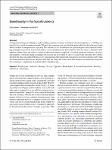Item Infomation
Full metadata record
| DC Field | Value | Language |
|---|---|---|
| dc.contributor.author | Uzma, Khan | - |
| dc.contributor.author | Alexander, DePaoli | - |
| dc.date.accessioned | 2023-05-11T01:40:25Z | - |
| dc.date.available | 2023-05-11T01:40:25Z | - |
| dc.date.issued | 2023 | - |
| dc.identifier.uri | https://link.springer.com/article/10.1007/s11747-023-00924-8 | - |
| dc.identifier.uri | https://dlib.phenikaa-uni.edu.vn/handle/PNK/8434 | - |
| dc.description | CC BY | vi |
| dc.description.abstract | An important managerial challenge is understanding consumers’ reactions to stockouts of a desired product―will they stay brand loyal or switch to competing brands? We posit that consumers are more likely to prefer substitutes from the same brand when a stockout is unexpected (vs. expected). This tendency arises as consumers feel greater negative affect upon encountering an unexpected stockout, which leads them to choose alternatives that provide greater affective value to ameliorate their negative feelings. Since the brand is a relatively affect-rich attribute compared to common non-brand attributes (e.g., price and quantity), consumers facing an unexpected stockout are more likely to choose a same-brand substitute. Five studies illustrate the effect and support the process by demonstrating that unexpected stockouts do not result in brand loyalty when non-brand attributes offer greater affective value than the brand. We further show that managers systematically mispredict how consumers’ expectations of stockouts relate to brand loyalty. | vi |
| dc.language.iso | en | vi |
| dc.publisher | Springer | vi |
| dc.subject | stockout | vi |
| dc.subject | important managerial challenge | vi |
| dc.title | Brand loyalty in the face of stockouts | vi |
| dc.type | Book | vi |
| Appears in Collections | ||
| OER - Kinh tế và Quản lý | ||
Files in This Item:

